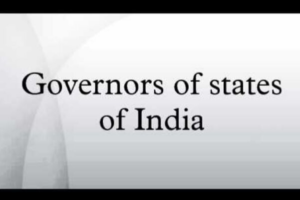The Governor of states and their functions
All you need to know about the Governor of states and their functions
This article aims to delve into the powers and responsibilities of the Governors of states of India, their appointment and their executive powers from the perspective of the SSC CGL/CHSL and Banking examinations.

Article 153 of the Indian Constitution appoints a Governor for each state in the Country.
Article 154 states the executive powers and responsibilities bestowed in him by m the country which are exercised directly by him or his subordinates.
7 th amendment of 1956 modified the constitution so that 2 or more states can have the same governor.
Article 157 and 158 of the Indian constitution lay down the qualifications for a person to become a governor which are as follows:
The person must be a citizen of India.
She/he must be of at least 35 years of age.
The person shouldn’t be a member of the parliament nor be a member of the state legislature.
The person shouldn’t hold an office of profit under the government.
Article 155 and 156 deal with the appointment and the tenure of the governor which are as follows:
The governor of a state is appointed by the president of the country.
The governor holds office during the pleasure of the president.
The normal tenure of a governor is 5 years.
A president can transfer the governor from 1 state to another for the remainder of their term.
A governor can be reappointed in any state.
Article 159 of the Indian constitution is concerned with oath of the governor.
Article 160 instills the president to make provisions for the discharge of the
functions of the governor.
Read more: Current affairs of September 2019
Read more: History Notes: What was Indus Valley Civilization?
Powers of the governor
Executive Powers
The executive powers of the governor are similar to that of the president except are exercised only in the state.
The governor is the nominal head of the state. She/he appoints the chief
minister of the state, other ministers on the advice of the Chief Minister and the advocate general.
The governor however exercises executive powers on behalf of the president under the president rule in a state.
The governor cannot impose an emergency in the state but can recommend the imposition of the emergency to the president.
Legislative Powers
When a bill other than a money bill is introduced and passed in the parliament, it needs the final assent of the governor.
The governor can send back the bill for reconsideration or withhold his assent (Pocket Veto) if he deems necessary.
However, a money bill is introduced only after the assent of the governor and hence does not require his/her final assent. Instead, the president is responsible for the final assent.
Article 176 instills the governor to summon and dismiss the state legislature when it loses confidence.
Financial Powers
The governor lays the state budget before the legislature.
No money bill can be introduced without his/her recommendation.
Money from the contingency fund can only be withdrawn after their
recommendations.
The governor constitutes the finance commission to manage the finance of
municipalities and panchayats.
Judicial Powers
The president consults the Governor of the state while appointing the judges of the state’s high court.
He/she has the power to pardon an accused of any offence within the jurisdiction of the state.
The governor can:
1. Pardon– completely remove the charges of the offender
2. Reprieve– put a stay on the execution of the sentence
3. Respite– give a lesser punishment
4. Remission- reduction of the sentence without changing the character
5. Commutation– substitute the sentence of one form with another
Discretionary Powers
The governor can choose a chief minister of his/her choice and ask them to gain majority if there is no clear majority in the legislature.
The governor can impose president’s rule in the country.
During emergency as per article 353, the governor can override the council of ministers if permitted by the president.
Impeachment of the governor
The governor can be removed by the President if he/she deems necessary.
However the removal of the governor can be challenged in any court of law and he/she cannot be removed arbitrarily by the president.
Lieutenant Governors / Adminstrators function as governors who carry out similar tasks in Union Territories of the country.
Presently, Andaman and Nicobar Islands, Ladakh, Jammu, Kashmir, Delhi and Puducherry have lieutenant governors.
Other Union-Territories have administrators.
However, the governor of Punjab acts as the Governor for Chandigarh.
